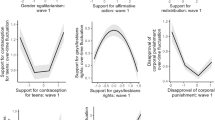Abstract
This paper shows a variety of evidence that members of Congress are ideologically consistent. Based upon the roll call voting record, once elected to Congress, members adopt a consistent ideological position and maintain it over time. There may be changing minds, but they are not in Congress.
Similar content being viewed by others
References
Cahoon, L.S., Hinich, M.J., Ordeshook, P.C. (1976). A Multidimensional Statistical Procedure for Spatial Analysis. Manuscript. Carnegie-Mellon University.
Carmines, E.G., Stimson, J.A. (1989). Issue evolution: Race and the transformation of American politics. Princeton, NJ: Princeton University Press.
Clausen, A. (1974). How Congressmen decide: A policy focus. New York: St. Martin's Press.
Clinton, J., Jackman, S.D., Rivers, D. (2004). The statistical analysis of roll call data. American Political Science Review, 98, 355–370.
Converse, P.E. (1964). The nature of belief systems in Mass publics. In D.E. Apter (Ed.), Ideology and discontent. New York: Free Press.
Cox, G.W., Katz, J.N. (2002). Elbridge Gerry's Salamander: The electoral consequences of the reapportionment revolution. New York: Cambridge.
Cox, G.W., Poole, K.T. (2002a). On measuring partisanship in roll call voting: The U.S. House of Representatives, 1877–1999. American Journal of Political Science, 46, 477–489.
Cox, G.W., Poole, K.T. (2002b). Measuring Group Differences in Roll Call Voting. Manuscript, University of Houston.
DiMaggio, P., Evans, J., Bryson, B. (1996). Have Americans' social attitudes become more polarized? American Journal of Sociology, 102, 690–755.
Enelow, J.M., Hinich, M. (1984). The spatial theory of voting. New York: Cambridge University Press.
Evans, J.H. (2003). Have Americans' attitudes become more polarized? An update. Social Science Quarterly, 84, 71–90.
Fenno, R.F. Jr. (1978). Home style: House Members in their districts. Boston: Little, Brown.
Fiorina, M.P. (2006). Culture war? The myth of a polarized America. New York: Pearson Longman.
Froman, L.A. Jr. (1971). Differences between the House and Senate. In R. Wolfinger (Ed.), Readings on Congress. Englewood Cliffs, NJ: Prentice-Hall.
Glazer, A., Robbins, M. (1983). Voters and roll call voting: The effect of congressional elections. Political Behavior, 5, 377–390.
Heckman, J.J., Snyder, J.M. (1997). Linear probability models of the demand for attributes with an empirical application to estimating the preferences of legislators. Rand Journal of Economics, 28, 142–189.
Hinich, M.J., Munger, M.J. (1994). Ideology and the theory of political choice. Ann Arbor: The University of Michigan Press.
Hinich, M.J., Munger, M. (1997). Analytical politics. New York: Cambridge University Press.
Hinich, M.J., Pollard, W. (1981). A new approach to the spatial theory of electoral competition. American Journal of Political Science, 25, 323–341.
Hoffer, E. (1951). The true believer: Thoughts on the nature of mass movements. New York: Harper Row (Perennial Library Edition, 1966, 1989).
Jackman, S.D. (2000a). Estimation and Inference via Bayesian simulation: An introduction to Markov Chain Monte Carlo. American Journal of Political Science, 44, 375–404.
Jackman, S.D. (2000b). Estimation and inference are ‘Missing Data’ problems: Unifying social science statistics via Bayesian simulation. Political Analysis, 8, 307–332.
Jackman, S.D. (2001). Multidimensional analysis of roll call data via Bayesian simulation: Identification, estimation, inference and model checking. Political Analysis, 9, 227–241.
Jacobson, G.C. (2006). A divider, not a uniter: George W. Bush and the American people. New York: Pearson Longman.
Kernell, S. (1973). Is the Senate more liberal than the House? Journal of Politics, 35, 332–363.
King, D. (1998). Party competition and polarization in American politics. Paper prepared for the 1998 Annual Meeting of the Midwest Political Science Association.
Krehbiel, K. (1993). Where's the party? British Journal of Political Science, 23(1), 235–266.
Loomis, M. (1995). Constituent influences outside the structure of spatial voting. Doctoral Dissertation, Carnegie-Mellon University.
McCarty, N.M., Poole, K.T. (1995). Veto power and legislation: An empirical analysis of executive and legislative bargaining from 1961–1986. Journal of Law, Economics, and Organization, 11, 282–312.
McCarty, N.M., Poole, K.T., Rosenthal, H. (1997). Income redistribution and the realignment of American politics. Washington, DC: AEI Press.
McCarty, N.M., Poole, K.T., Rosenthal, H. (2001). The Hunt for party discipline in congress. The American Political Science Review, 95, 673–687.
McCarty, N.M., Poole, K.T., Rosenthal, H. (2006). Polarized America: The dance of ideology and unequal riches. Cambridge, MA: The MIT Press.
Nokken, T.P. (2000). Dynamics of congressional loyalty: Party defection and roll call behavior, 1947–1997. Legislative Studies Quarterly, 25, 417–444.
Ordeshook, P.C. (1976). The spatial theory of elections: A review and a critique. In I. Budge, I. Crewe, D. Farlie (Eds.), Party identification and beyond. New York: Wiley.
Poole, K.T. (1990). Least squares metric, unidimensional scaling of multivariate linear models. Psychometrika, 55, 123–149.
Poole, K.T. (1998). Recovering a basic space from a set of issue scales. American Journal of Political Science, 42, 954–993.
Poole, K.T. (2000). Non-parametric unfolding of binary choice data. Political Analysis, 8, 211–237.
Poole, K.T. (2001). The geometry of multidimensional quadratic utility in models of parliamentary roll call voting. Political Analysis, 9, 211–226.
Poole, K.T. (2005). Spatial models of parliamentary voting. New York: Cambridge University Press.
Poole, K.T., Rosenthal, H. (1984). The polarization of American politics. Journal of Politics, 46, 1061–1079.
Poole, K.T., Rosenthal, H. (1997). Congress: A political-economic history of roll call voting. New York: Oxford University Press.
Poole, K.T., Rosenthal, H. (2001). D-NOMINATE after 10 years: A comparative update to congress: A political-economic history of roll call voting. Legislative Studies Quarterly, 26, 5–26.
Rothenberg, L.S., Sanders, M.S. (2000). Severing the electoral connection: Shirking in the contemporary congress. American Journal of Political Science, 44, 316–325.
Snyder, J.M. Jr., Groseclose, T. (2000). Estimating party influence in congressional roll-call voting. American Journal of Political Science, 44(2), 193–211.
Stratmann, T. (2000). Congressional voting over legislative careers: Shifting positions and changing constraints. American Political Science Review, 94, 665–676.
Weisberg, H.F. (1968). Dimensional analysis of legislative roll calls. Doctoral dissertation, University of Michigan.
Wills, G. (1982). The Federalist Papers by Alexander Hamilton, James Madison, and John Jay. New York: Bantam Books.
Author information
Authors and Affiliations
Corresponding author
Rights and permissions
About this article
Cite this article
Poole, K.T. Changing minds? Not in Congress!. Public Choice 131, 435–451 (2007). https://doi.org/10.1007/s11127-006-9124-y
Received:
Accepted:
Published:
Issue Date:
DOI: https://doi.org/10.1007/s11127-006-9124-y




